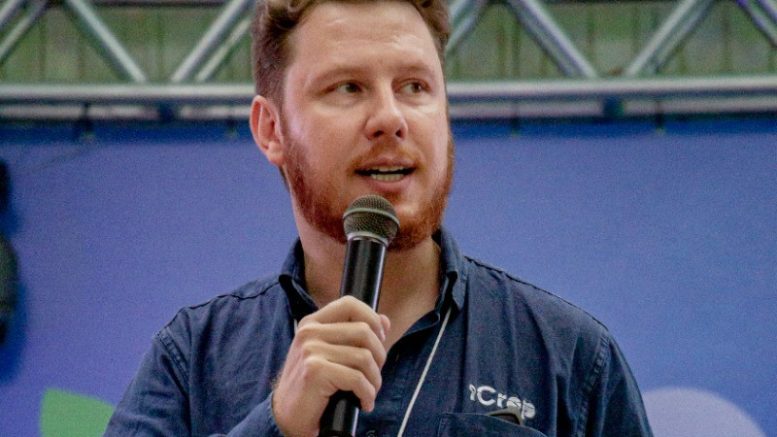“…o investimento é recomendado para quem busca eficiência, sustentabilidade e alto desempenho produtivo…”
Daniel Campanelli é CTO da iCrop, graduado em ciências biológicas pela Universidade Estadual do Norte do Paraná, com doutorado pela Universidade Estadual de Londrina, especialista em Auditoria e Gestão Ambiental pela Universidade Tecnológica Federal do Paraná, mestre em agronomia pela UENP e graduado em engenharia agronômica pela UNOPAR.

Daniel Campanelli, CTO da iCrop
AgriBrasilis – Que tecnologias estão revolucionando as práticas de irrigação?
Daniel Campanelli – As principais inovações combinam dados, precisão, conectividade e inteligência. Softwares de gestão permitem acompanhar o uso da água conforme o estágio da cultura. Estações meteorológicas fornecem dados locais, essenciais para calibrar a estratégia de irrigação. Nossos algoritmos foram treinados para vários tipos de solos, regiões e culturas e ajudam a evitar tanto o excesso quanto a escassez de água. Sistemas automatizados otimizam a aplicação, enquanto imagens de satélite contribuem para identificar falhas e assimetrias no campo.
AgriBrasilis – Quais os custos da adoção da irrigação de alta tecnologia?
Daniel Campanelli – Os custos variam conforme a área irrigada, o tipo de cultura e o nível de automação desejado. Sistemas como pivôs centrais demandam maior investimento inicial, mas entregam alto desempenho e precisão. Tecnologias de monitoramento e gestão, por sua vez, contribuem para reduzir o número de irrigações, o consumo de energia e o desgaste dos equipamentos. A médio e longo prazo, o investimento tende a se pagar com maior produtividade, economia de insumos e previsibilidade operacional.
AgriBrasilis – Em que situações se recomenda esse investimento?
Daniel Campanelli – A irrigação de alta tecnologia é indicada especialmente quando há necessidade de:
- Aumentar a produtividade em culturas sensíveis, como feijão e trigo.
- Mitigar impactos de escassez hídrica, frequente em áreas de algodão e milho.
- Reduzir perdas causadas por variações climáticas, como ocorre com o café.
- Manter a uniformidade e reduzir custos operacionais, relevante para a soja.
- Maximizar cada gota de água, sobretudo em regiões com energia cara ou disponibilidade hídrica limitada.
Em resumo, o investimento é recomendado para quem busca eficiência, sustentabilidade e alto desempenho produtivo.
“…em cultivos como milho e algodão, evita perdas causadas por excesso ou deficiência hídrica.”
AgriBrasilis – Por que a coleta de dados é tão importante para a irrigação? Que dados são coletados e por quê?
Daniel Campanelli – Porque dados permitem decisões embasadas e oportunas. A umidade do solo, por exemplo, evita irrigar desnecessariamente o feijão ou deixar faltar água na formação de tubérculos da batata. Há fases fenológicas críticas — como a floração no trigo e no café ou o enchimento de grãos na soja. Dados climáticos (temperatura, precipitação, radiação) ajudam a ajustar o volume de água para que esteja disponível para a planta no momento certo. Já a evapotranspiração (ETc) quantifica a necessidade real de água, sendo base para o manejo inteligente em qualquer cultura.
AgriBrasilis – Como é realizado o monitoramento climático para gestão de irrigação?
Daniel Campanelli – A iCrop opera uma rede com mais de duas mil estações meteorológicas no Brasil, integradas a modelos preditivos. Essa infraestrutura gera recomendações com base em previsão de chuvas, temperatura e evapotranspiração (ETc). No trigo, por exemplo, ajuda a evitar perdas em estágios críticos; no café, antecipa a irrigação para favorecer a florada; na batata, ajusta os volumes na maturação, prevenindo doenças e perdas de qualidade.
AgriBrasilis – O que é evapotranspiração e por que o produtor precisa monitorar esse fator nas lavouras?
Daniel Campanelli – A evapotranspiração (ETc) representa a soma da água evaporada do solo com a transpirada pelas plantas. Monitorar esse dado permite aplicar a quantidade ideal de água no momento certo. No trigo, isso garante maior uniformidade dos grãos; na batata, melhora o calibre e a qualidade dos tubérculos. Em cultivos como milho e algodão, evita perdas causadas por excesso ou deficiência hídrica. A ETc é a base técnica para o manejo racional da água.
AgriBrasilis – Por que a prática de irrigação ainda é tão pouco difundida no Brasil?
Daniel Campanelli – Ainda há barreiras importantes: alto custo inicial, dificuldade de acesso a crédito, regulamentações complexas sobre uso da água e a percepção de que irrigar é algo complicado.
A iCrop atua para transformar essa realidade, com soluções acessíveis, intuitivas e adaptadas ao campo. Nosso serviço de Gestão de Irrigação combina consultoria especializada com software de monitoramento, garantindo eficiência hídrica com base em dados reais da fazenda.
Para quem está começando, o iCrop Projetos desenha todo o sistema de irrigação sob medida. Para quem já tem sistemas instalados, a Reengenharia aumenta a vida útil dos equipamentos e reduz perdas. Irrigação não é luxo, é estratégia.
Atuamos também na gestão inteligente de outro recurso fundamental, a eletricidade. Com o iCrop Power, o produtor monitora o consumo energético em tempo real, identificando oportunidades de economia. Por fim, nossas Soluções Meteorológicas fornecem dados climáticos confiáveis, direto do campo.
LEIA MAIS:

